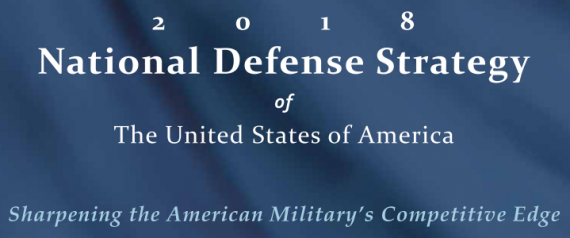New ‘National Defense Strategy’ Not All That New
My latest for The National Interest takes a contrarian view on the new National Defense Strategy.
My latest for The National Interest, written on January 23, finally cleared the backlog and hit the streets overnight.
The New National Defense Strategy: Everything is a Priority
Lost to all but the most committed security wonks in the midst of the government shutdown debacle was the unveiling by Secretary Jim Mattis of a new National Defense Strategy. At first blush, it’s a bold declaration of the Trump administration’s priorities. In reality, there’s little new here—least of all a real strategy.
[…]
The most remarked-upon aspect of the new NDS is its declaration that “the central challenge to U.S. prosperity and security is the reemergence of long-term, strategic competition by what the National Security Strategy classifies as revisionist powers.” But this isn’t really that remarkable. While it’s true that the 2008 NDS declares, “For the foreseeable future, this environment will be defined by a global struggle against a violent extremist ideology that seeks to overturn the international state system,” that’s hardly shocking given that the wars in Iraq and Afghanistan were in full swing. But even that document conceded, in the very next sentence, “Beyond this transnational struggle, we face other threats, including a variety of irregular challenges, the quest by rogue states for nuclear weapons, and the rising military power of other states.” Literally all of those remain, if in different sequence, in the 2018 version.
[…]
Regardless, while the Defense Department has devoted enormous resources to fighting violent extremism in the aftermath of the 9/11 attacks, planning for war with near-peer adversaries has always been front and center—especially at the level of the service departments (Army, Navy, Air Force, and Marines), which are responsible for organizing, training, and equipping our armed forces. F-35 fighters and Ford-class carriers weren’t bought with Al Qaeda or the Islamic State in mind.
Earlier this week, Tom Spoehr rightly observes, “To have real-world value, a defense strategy must establish priorities. That requires making tough choices.” But I couldn’t disagree more with his assessment that “in this document those choices are made.” Yes, as Spoehr notes, there’s the aforementioned declaration that China and Russia pose the “central challenge.” But there’s nothing in either the document or the actions in the first year of the Trump administration to indicate that lesser challenges will receive any less attention than they have in the recent past.
While China—and especially Russia—are called out much more vociferously than in the previous two defense strategies and termed “principal priorities for the Department,” they’re also termed “long-term strategic competitions,” language very similar to those of the 2008 and 2012 documents. As to the lesser threats, “Concurrently, the Department will sustain its efforts to deter and counter rogue regimes such as North Korea and Iran, defeat terrorist threats to the United States, and consolidate our gains in Iraq and Afghanistan while moving to a more resource-sustainable approach.” Granting that one wouldn’t expect an unclassified, public-facing document to tell adversaries that they’re not a priority, it’s hard to read “sustain,” “defeat,” and “consolidate” as some sort of cutback.
[…]
If the United States wishes to have global hegemony, then it needs to do precisely what Mattis is asking for. Being able to deter and, if it comes to it, defeat major powers like China and Russia while at the same time constraining rogue regimes like Iran and North Korea, as well as non-state actors like the Islamic State and Boko Haram, and while maintaining access to the global commons of sea, space and cyberspace, is going to require that the United States spend a whole lot more money than it’s already spending. There is little evidence, however, that there is the political will to implement massive tax hikes or cut funding elsewhere in the budget in order to achieve that goal.
It’s more fleshed out at the link but that the crux of the argument.







The NDS reads like someone went around the Joint Chiefs conference table and asked everyone what new toys they wanted for Christmas. Mattis is promising a lot of ponies to a lot of generals. I agree that not only does it not constitute a strategy, it’s more Whitman’s Sampler than Pez dispenser when it comes to priorities.
I don’t think we are going to remain hegemon, whatever Mattis cooks up. We have lost what the Chinese call ‘the mandate of heaven.’ The world no longer looks to us to point the way to the future, they look increasingly to China. We’ve lost ground in Africa, Europe and even more in Asia. We are no longer a country capable of maintaining the post WW2 regime, let alone define the future. We’ve thrown all that away, and for nothing.
An honest NDS would call for retrenchment, an end to Afghanistan, a retreat to a sort of super-regional power status. Continuing to imagine that we are what we were a couple of years ago is pointless. That US is done, now we need to take an honest look at what we can or wish to salvage, and how we can reconstitute our position along humbler lines.
if you plot the % of the popular vote earned by the last 7-8 GOP presidential contenders, and fit a trend line to it, the slope is down The distortion of the Electoral College can only last so long. Gerrymanders are being ruled against increasingly. Trump’s trashing what’s left of their reputations, abortion support is increasing, they might start deporting DREAMers, and Ryan is mumbling about taking on entitlement cuts this year. Add the upcoming indictments and prosecutions, and the record House retirements by Republicans, and things could be very different a year from now, different still 3.
Our military is used for more than defense. Defense means deterring wars against the US and winning wars that are not deterred. We use our military to pressure other states into policies that we favor, and when pressure is not enough we have used military force to try to effect regime change. This much larger mission is an enormous undertaking requiring an enormous commitment of resources. The threat of our military strength led to the economic collapse of the USSR, and that was its largest victory. On the other hand, in Korea, Vietman, Iraq, and Syria the military strategy has been thwarted. Since we are openly contemptuous of diplomacy, we are too predictable. We are like a football team that passes on every play, and when the oppo defends this we start looking for another flanker to catch our predictable passes.
We need to think better not shoot better. What are America’s interests in the Levant? Why not seek rapprochement with Iran instead of confrontation?
That’s a feature, not a bug. You really don’t want the new ‘minds’ in this administration to be affecting our global military strategy. At all.
This document is about as close as one could come to saying “The Obama administration pretty much had it right; we’re going to keep doing that” without using the O-word. Which is not really surprising, given the momentum of long-term Defense budget plans and bureaucracy.